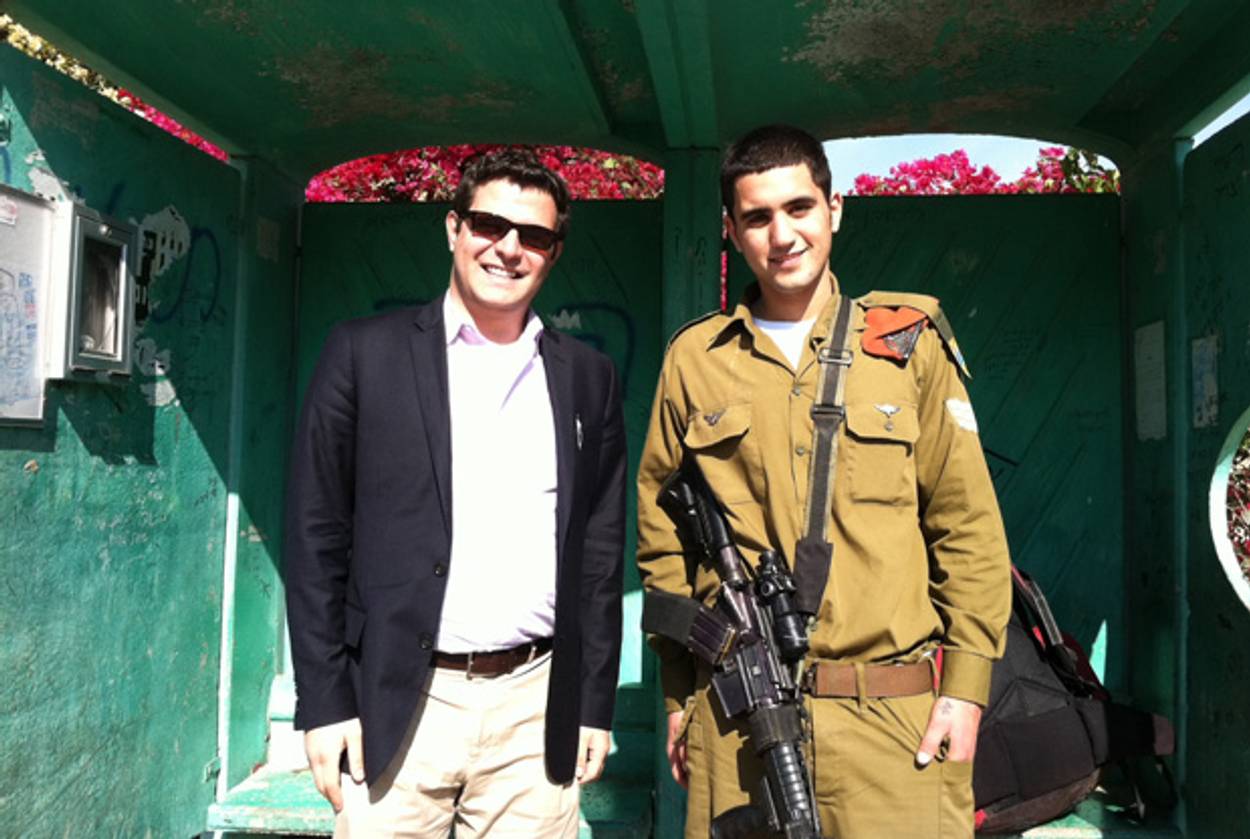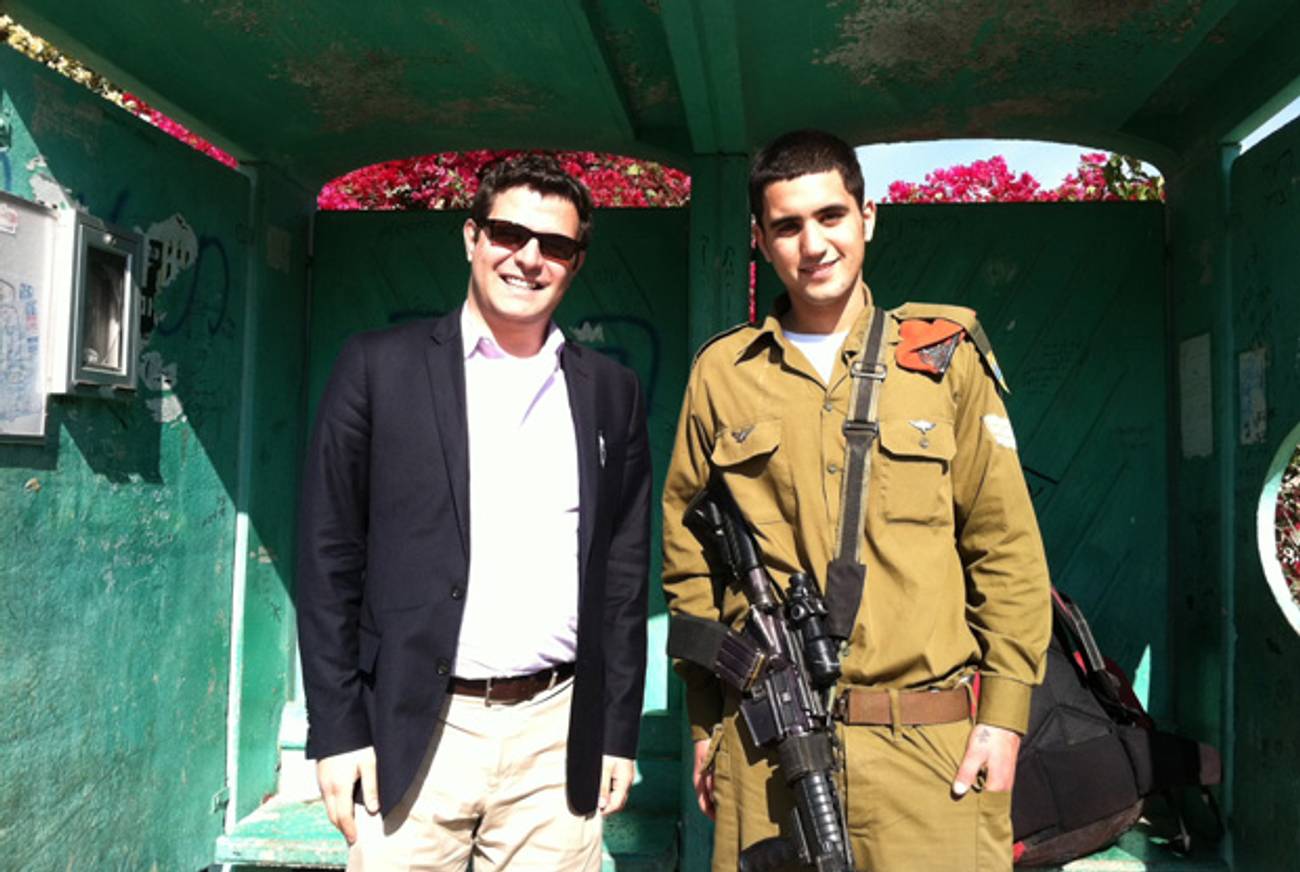Iran Around Tel Aviv
A writer born in the capital of Holocaust denial tours the Jewish state as the cold war between Iran and Israel is about to get hot




“Which congregation in Boston do you belong to, sir?” the El Al security officer asked me, her English inflected by a distinctive Israeli accent. “None,” I responded. The officer, for whom such questioning is standard operating procedure, took an incredulous second glance at my U.S. passport, which identifies Iran as my birthplace, and repeated herself: “But is there a synagogue you attend in Boston, even occasionally? Or surely your parents belong to a congregation?” I shook my head. “Actually, I’m not Jewish.”
“OK, please stand right here,” she said, pointing to where I was already standing. Then she scurried over to a tall male officer—her supervisor, presumably, though he couldn’t have been older than 26. The two spoke a few words, inaudible to me, but one needn’t have been a genius to discern the substance of their exchange: A Muslim-born man hailing from the world capital of Holocaust denial seeks to enter the Jewish state just as the simmering cold war between Iran and Israel is about to get hot. His age bracket is ripe for waging physical jihad. Oh, and he doesn’t belong to a shul.
When the officers returned, the interrogation continued: What was the purpose of my trip? Had someone else packed my bags? Did I personally know the American Jewish Committee’s Israel office director? (I was traveling as part of an AJC delegation.) Another member of the trip, a political leader in Boston, tried to leverage his Jewishness to intercede on my behalf. “Hey, I know this guy,” he told the officers. “We’re friends.” But things only got comically worse when my friend had to concede that we had first met two hours ago. My dry mouth, racing heart, and shaky voice signaled my psychological return back to the region I was born after more than a decade’s absence—and we were still in New York’s John F. Kennedy Airport.
Eventually, I was allowed to enter the gate and board the flight to Tel Aviv. After years of traveling with an Iranian passport—terrific if you want to see Pyongyang, but otherwise perfectly useless—obtaining a U.S. passport was one of the best aspects of becoming an American for me. So, it would be dishonest to say that I didn’t resent the El Al grilling, not to mention the additional waiting at Ben Gurion Airport.
But one has to put things in perspective. Iran and Israel are on the verge of war. It’s a testament to the openness and self-confidence of the Jewish state that a 20-minute questioning was all it took for me to get in under these circumstances. And if you think El Al security is harsh, try entering—and then leaving—Tehran with an Israeli passport.
Once I was roaming Tel Aviv’s streets on my own, the city’s warm people and proximity to the Mediterranean washed away the airport-security stress. Of Israel’s two largest cities, I had always been most curious about Tel Aviv, with its white Bauhaus-style apartment buildings, its beaches, and the irresistible urgency of its nightlife—an existentialist joie de vivre born of constant conflict.
“Existential” is a term one hears quite often from Israelis. There is of course the existential threat from a regime racing toward nuclear weapons in my birthplace, Tehran, where the dream of wiping Israel off the map is something of a national tenet. But there are other menaces, as well. “Internally, it’s the changing demographic landscape that poses an existential threat,” Robert Silverman, a political counselor at the United States Embassy in Tel Aviv, told our group, referring to the bulge of unemployed ultra-Orthodox challenging Israel’s famously liberal ethos.
But in Tel Aviv, that ethos appeared as vital as I had imagined it. At a Spanish bar called Vicky Christina, the aroma of fresh seafood tapas and Israeli micro-brews drove the roiling turmoil across the Sinai and the massacres in Syria out of mind. Nataly, a beautiful interior designer who worked at the restaurant, was pleasantly indifferent to my Iranian origins. But she was also unmoved by a suggestion that we meet up later for the sake of world peace.
This atmosphere, according to Tel Aviv University political scientist Yossi Shain, is part of a broader pattern. “The ethos of the state has changed from collective identities to capitalism and individualism,” he told our delegation. “We want to get away from history, from the enemy.” Yet history always beckons. On my visit, the prospect of Iranian mullahs armed with nuclear weapons loomed largest, with many Tel Avivans expressing a combination of fear, numbness, and determination as their government hints at a possible strike against the Islamic Republic.
The gravity of the situation was only heightened by the Purim festivities under way. On Purim, Jews mark their rescue from genocide at the hands of Haman, an ancient Persian vizier. Meeting Israelis at bars and restaurants, I couldn’t help but fear they saw me as the living embodiment of the latter-day Haman-state—similar to how Annie Hall’s old-fashioned aunt views Woody Allen’s character, Alvie Singer, during the Thanksgiving lunch scene. Some surely did, as evidenced by the rapid drop in the social temperature when I said I was Iranian.
Many more, though, were oblivious to the political subtext of our encounters. For young Israelis, after all, Purim is like Halloween: an opportunity to dress provocatively and drink to excess. “You have to buy a costume,” Naomie, a young law student who had recently finished her IDF service, urged me. My quip about dressing up as an ayatollah fell flat, but much (interfaith) fun was had discussing the prospect of a “sexy mohel” costume.
Earlier, at Molly Bloom’s in Tel Aviv—perhaps the world’s most cleverly named Irish pub—I met up with a fellow journalist with whom I had been corresponding for a few months. Soon enough, the combined effects of jetlag and a few pints of beer had me waxing poetic about the possibilities of Iranian-Israeli friendship. It’s precisely at this most dark moment that the two peoples should be reaching out to each other, I went on.
All true. Yet saying all this out loud was somehow unnecessary and awkward—like when two people explicitly lay out the bases of an old and unspoken camaraderie. “Cheers to that,” said my friend, and down went more beer.
Sohrab Ahmari is the assistant books editor at The Wall Street Journal and co-editor of Arab Spring Dreams, an anthology of essays by young Mideast reformers.
Sohrab Ahmari is the assistant books editor at The Wall Street Journal and co-editor of Arab Spring Dreams, an anthology of essays by young Mideast reformers.